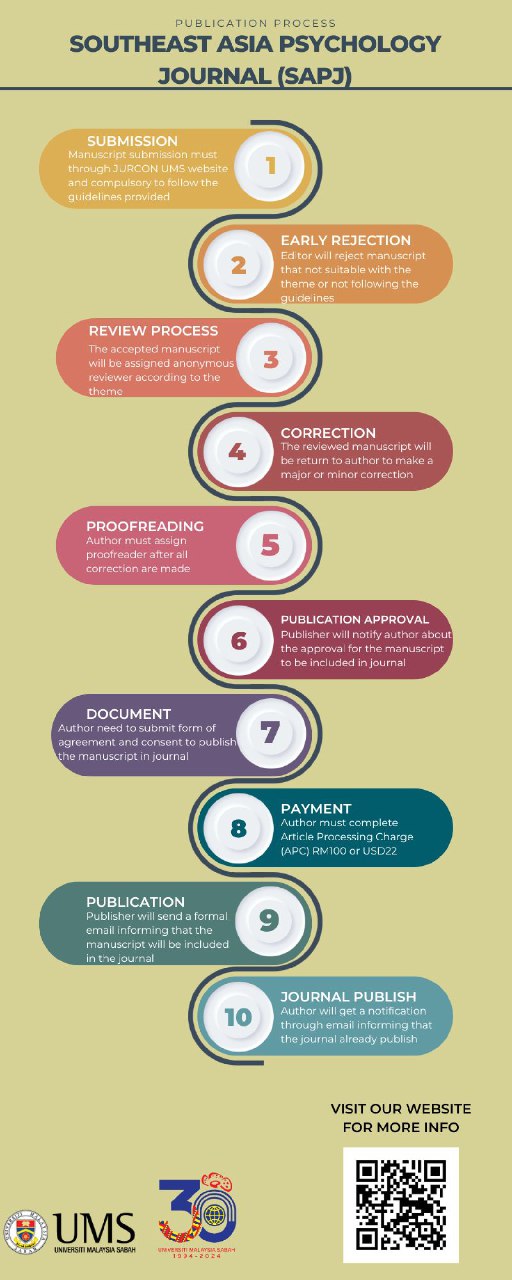Locus of Control, Marital Satisfaction and Marital Stability among Newlyweds
Keywords:
locus of control, marital satisfaction, marital stability, newlywedsAbstract
The present study examined the relationship between locus of control with marital satisfaction and marital stability in a sample of 278 newlyweds. Participants completed the Demographic Information Sheet, The Internality, Powerful Others, and Chance (IPC) Scale, Kansas Marital Satisfaction Scale (KMSS) and Marital Instability Index (MII). Correlation analysis was employed to assess relationships among the variables. Result indicated that there is a negative significant relationship between external locus of control and marital satisfaction, but there is no significant relationship between internal locus of control and marital satisfaction. Whereas, there is no significant relationship between both locus of control with marital stability. This study incongruent with past research and contributes to the new findings on locus of control.
References
Chatfield, H., & Wooten, A. (2012). Who is in control of your employee’s be haviour? The Locus of Control Impact. Retrieved from
http://c.ymcdn.com/sites/www.incentivemarketing.org/resource/resmgr/imported/Locus%20%20of% 20Control%20%20final.pdf
Doherthy, W J (1981). Locus of control difference and marital dissatisfaction. Journal of marriage and the family. 43, 369-377.
Doherty W. J. (1983) Locus of control and marital interaction. In Lefcourt H. M. (Ed.), Research with the locus of control construct. Vol. 2. Methods and applications. New York: Academic Press. Pp. 245–277.
Doherty W. J., Ryder R. G. (1979) Locus of control, interpersonal trust, and assertive behavior among newlyweds. Journal of Personality and Social Psychology, 37, 2212–2220.
Fatemeh Solaimani. (2014). Comparing Control Locus and Quality of Life in Spouses with High and Low Marital Satisfaction. .J Life Sci. Biomed. 4(2):131-134.
H. Nejat Basım, Mehmet Erkenekli, & Harun Şeşen. 2010. The Relationship of Locus of Control in Individual Behavior with the Perception of Role Conflict and Role Ambiguity: An Investigation in the Public Sector. TODAĐE’s Review of Public Administration, Volume 4 No 1 March 2010, p.169-189.
Hoffman H, Kupper Z, Kunz B. (2000). Hopelessness and its impact on rehabilitation outcome in schizophrenia-an exploratory study. Schizophrenia Research. 2000;43:147–158.
Judge, T.A. & Bono, J.E. (2001). Relationship of core self-evaluations traits-self-esteem, generalized self-efficacy, locus of control, and emotional stability-with job satisfaction and job performance: A meta-analysis. Journal of Applied Psychology, 86(1), 80-92.
Lachman, M.E. & Weaver, S.L. (1998). Sociodemographic variations in the sense of control by domain: Findings from the Mac Arthur Studies of midlife. Psychology and Aging, 13(4), 553562.
Lefcourt, Herbert M. (1992). Durability and impact of the locus of control construct. Psychological Bulletin, Vol 112(3), Nov 1992, 411-414. http://dx.doi.org/10.1037/0033-2909.112.3.411.
Campis, L.K., Lyman, R.D., & Prentice-Dunn, S. (1986). The parental locus of control scale: development and validation. Journal of Clinical Child Psychology Vol. 15 , Iss. 3.
Khan, Aqeel Ahmad; Saleem, Muhammad; Shahid, Raheela,(2012), “Buffering Role of Locus of Control on Stress among the College/University Teachers of Bahawalpur”. Pakistan Journal of Commercial social science, vol 6(1) pg 158 - 167.
Malcom, Karen Dethlefsen,. (1994). Self-esteem, internal locus of control: relationship to marital satisfaction. Retrospective theses and dissertations. 10754. http://lib.dr.iastate.edu/rtd/10754.
Markman, H.J., Floyd, F.J., Stanley, S.M., & Storaasli, R.D. (1988). Prevention of marital distress: A longitidunal investigation. Journal of Consulting and Clinical Psychology, 56(2), 210-217.




